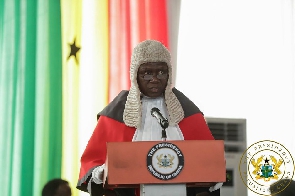The Supreme Court has in a unanimous decision ruled that the Chairperson of the Electoral Commission, Jean Mensa, and Peter Mac Manu, Campaign Manager and representative for 2nd Respondent, Nana Addo Dankwa Akufo-Addo cannot be forced to testify in the Election Petition case.
The ruling on Thursday, February 11, 2021, on the back of a decision by lead counsel for the Electoral Commission, Justin Amenuvor and that of President Akufo-Addo, Akoto Ampaw, asking for permission not to call any witness.
Chief Justice Kwasi Anin-Yeboah, on behalf of the Justices of the Supreme Court, said the judges were not convinced by the contrary arguments made by Tsatsu Tsikata, lead counsel for the petitioner.
Again, the depositions in affidavits with regards to the interrogatories do not mean the witness can be compelled.
He explained that no provision in the constitution or statute has been pointed out to show the EC chairperson can be subjected to different rules contrary to established rules of procedure and settled practice.
Chief Justice Anin-Yeboah also sided with the respondents that the burden of proof lies on the petitioner and can only be shifted when that condition has been satisfied.
“We are minded to state that our jurisdiction invoked in this election petition is a limited jurisdiction clearly circumscribed by law. We do not intend to extend our mandate beyond what the law requires of us in such petitions brought under Article 64 (1) challenging the validity of the election of a president. Simply put, we are not convinced, and we will not yield to the invitation being extended to us by counsel for the petitioner to order the respondents to enter the witness box to be cross-examined. Accordingly, we hereby overrule the objection raised by the counsel for the petitioner against the decision of the respondents declining to adduce evidence in this petition,” he added.
Counsels for the Respondents had insisted that the evidence put forth by the petitioner, John Dramani Mahama, does not meet the burden of proof thereby making it unnecessary to put a witness for a counter case.
Citing Order 36 Order sub-rule 4 and 38, rule 3 (e) sub-rule 1 and 5 of CI 47 as amended by CI 87 as the basis for their decision to close their case and not call a witness, Justin Amenovor argued that the burden of proof in the petition hearing lies on the petitioner and therefore it will be wrong for the lead counsel for John Dramani Mahama to adduce evidence from the Chairperson of the EC, Jean Mensa.
Justin Amenovor suggested that other parties can treat the witness statement by the EC Chair as a “hearsay”.
Likewise, lead counsel for President Nana Addo Dankwa Akufo-Addo, Akoto Ampaw, also argued that the petitioner has not been able to make a solid case in court hence the decision to close their case.
He further insisted that the petitioner “should rather be happy since his petition would be ruled on by his own evidence”.
But disputing these arguments, lead counsel for the petitioner, Tsatsu Tsikata said since the lawyers have not made a submission of no case, the burden of proof does not apply as argued by the lawyers for the EC and Akufo-Addo.
He also explained that the EC Chairperson has a constitutional duty to give accounts of events that led to the December 9, 2020, election declarations and to clarify how some errors were made.
The Supreme Court then ordered the Respondents to file their addresses for the closure of their case by February 17.
The hearing has also been adjourned to February 18, 2021.
Read below the full ruling of the Supreme Court as read by the Chief Justice.
General News of Friday, 12 February 2021
Source: www.ghanaweb.com













